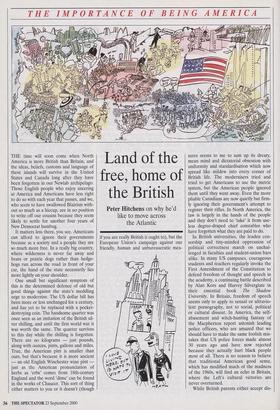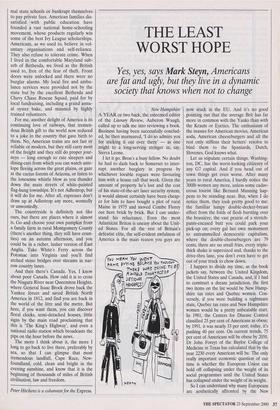THE IMPORTANCE OF BEING AMERICA
Land of the free, home of the British
THE time will soon come when North America is more British than Britain, and the ideas, beliefs, customs and language of these islands will survive in the United States and Canada long after they have been forgotten in our Newlab archipelago. Those English people who enjoy sneering at America and Americans have less right to do so with each year that passes, and we, who seem to have swallowed Blairism with- out so much as a hiccup, are in no position to write off our cousins because they seem likely to settle for another four years of New Democrat humbug.
It matters less there, you see. Americans can afford to ignore their governments because as a society and a people they are so much more free. In a really big country, where wilderness is never far away and bears or prairie dogs rather than hedge- hogs run across the road in front of your car, the hand of the state necessarily lies more lightly on your shoulder.
One small but significant symptom of this is the determined defence of old but good things against the state's meddling urge to modernise. The US dollar bill has been more or less unchanged for a century, and has yet to be replaced with a pocket- destroying coin. The handsome quarter was once seen as an imitation of the British sil- ver shilling, and until the first world war it was worth the same. The quarter survives to this day while the shilling is forgotten. There are no kilograms — just pounds, along with ounces, pints, gallons and miles. True, the American pint is smaller than ours, but that's because it is more ancient — an old English Winchester wine pint just as the American pronunciation of herbs as `erbs' comes from 18th-century England and the word 'dime' can be found in the works of Chaucer. This sort of thing either matters to you or it doesn't (though if you are really British it ought to), but the European Union's campaign against our friendly, human and unbureaucratic mea- sures seems to me to sum up its dreary, mean mind and dictatorial obsession with uniformity and standardisation which now spread like mildew into every corner of British life. The modernisers tried and tried to get Americans to use the metric system, but the American people ignored them until they went away. Even the more pliable Canadians are now quietly but firm- ly ignoring their government's attempt to register their rifles. In North America, the law is largely in the hands of the people and they don't need to 'take' it from use- less degree-draped chief constables who have forgotten what they are paid to do.
In British universities, the leaden cen- sorship and tiny-minded oppression of political correctness march on unchal- lenged in faculties and student-union bars alike. In many US campuses, courageous students and teachers regularly invoke the First Amendment of the Constitution to defend freedom of thought and speech in the academy, a continuing battle described by Alan Kors and Harvey Silverglate in their essential book The Shadow University. In Britain, freedom of speech seems only to apply to sexual or ultravio- lent pornography, not to social, political or cultural dissent. In America, the self- abasement and witch-hunting fantasy of the Macpherson report astonish leading police officers, who are amazed that we should have to make the same foolish mis- takes that US police forces made almost 30 years ago and have now rejected because they actually hurt black people most of all. There is no reason to believe that traditional American good sense, which has modified much of the madness of the 1960s, will find an echo in Britain, where the Left's cultural victories are never overturned.
While British parents either accept dis- mal state schools or bankrupt themselves to pay private fees, American families dis- satisfied with public education have founded a vast national home-schooling movement, whose products regularly win some of the best Ivy League scholarships. Americans, as we used to, believe in vol- untary organisations and self-reliance. They also refuse to tolerate crime. When I lived in the comfortable Maryland sub- urb of Bethesda, we lived as the British used to, free of the fear of theft. Front doors were unlocked and there were no burglar alarms. My local fire and ambu- lance services were provided not by the state but by the excellent Bethesda and Chevy Chase Rescue Squad, paid for by local fundraising, including a grand annu- al oyster bake, and manned by highly trained volunteers.
For me, another delight of America is its continuing love of railways, that tremen- dous British gift to the world now reduced to a joke in the country that gave birth to them. No, American trains are not fast or reliable or modern, but they still carry most of the freight and they still do proper jour- neys — long enough to rate sleepers and dining-cars from which you can watch ante- lope fleeing across the great plains, or gaze at the cactus forests of Arizona, or listen to the lonesome whistle blow as you thunder down the main streets of white-painted flag-hung townships. It's not Adlestrop, but it will do for me. After all, expresses don't draw up at Adlestrop any more, wontedly or unwontedly.
The countryside is definitely not like ours, but there are places where it almost is. Go and choose your own pumpkin from a family farm in rural Montgomery County (there's another thing, they still have coun- ties) on an autumn afternoon, and you could be in a richer, lusher version of East Anglia. Take White's Ferry across the Potomac into Virginia and you'll find arched stone bridges over streams in nar- row country lanes.
And then there's Canada. Yes, I know about poor Canada. How odd it is to cross the Niagara River near Queenston Heights, where General Isaac Brock drove back the Yankee forces and saved British North America in 1812, and find you are back in the world of the litre and the metre. But here, if you want them, you can discover floral clocks, semi-detached houses, little signs by the main road proclaiming that this is 'The King's Highway', and even a national radio station which broadcasts the pips on the hour before the news.
The more I think about it, the more I long to go back to live there, preferably by sea, so that I can glimpse that most tremendous landfall, Cape Race, New- foundland, cold, clean and bright in the evening sunshine, and know that it is the beginning of thousands of miles of British civilisation, law and freedom.
Peter Hitchens is a columnist for the Express.























































































 Previous page
Previous page